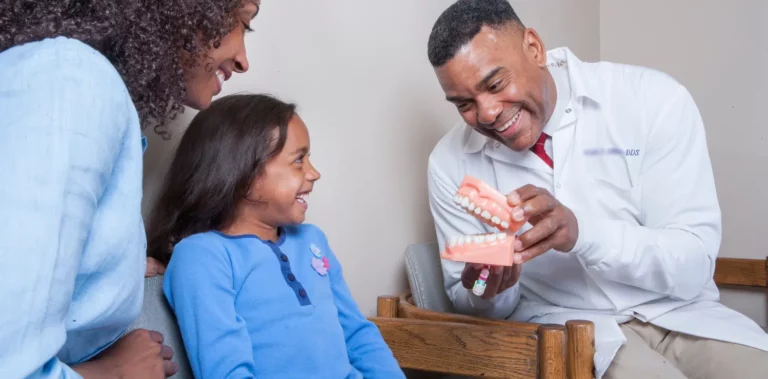As healthcare professionals, one of our greatest challenges is building trust with our young patients and their families. It goes beyond simply providing treatment; it involves delivering care that encompasses empathy, understanding, and respect. Building trust is crucial for effective healthcare, as it positively impacts the patient experience and leads to better treatment outcomes.
Here are some strategies that can be used to build trust:
1. Show Empathy & Actively Listen
Building trust with young patients and their families in pediatric healthcare hinges on the ability to show empathy and actively listen. Empathy in this context is more than just sympathizing; it’s about genuinely connecting with both the child and their family, sharing in their emotions. This involves tuning into not only what is said but also picking up on non-verbal cues, responding with sensitivity to create a safe, comforting environment. Actively listening helps deepen this connection. Healthcare professionals can foster this trust by using open-ended questions, encouraging both parents and children to express their concerns and feelings. This approach not only shows empathy but also aids in better understanding the unique needs of each family, allowing for more tailored and supportive care.
2. Use Effective Communication
Effective communication plays a key role in building trust with young patients and their families. It’s essential for healthcare professionals to use clear, age-appropriate language, transforming complex medical jargon into terms that are easily understandable. This approach not only reduces patient anxiety but also enhances compliance with treatment plans. Research underscores the importance of this strategy. Additionally, incorporating visuals like diagrams or simple illustrations can greatly aid in explanations, helping both children and parents to better visualize and comprehend medical concepts. These methods collectively contribute to a more trusting and effective healthcare experience.
3. Embrace Family-Centered Care
In pediatric care, embracing a family-centered approach is crucial. When treating a child, it’s important to remember that you are also caring for their family. Actively involving parents in healthcare decisions creates a collaborative environment that fosters mutual trust and improves compliance. By including parents in discussions about treatment plans and valuing their input, healthcare professionals not only make them feel respected but also empower them. This approach significantly strengthens the parents’ confidence in the care their child receives, establishing a solid foundation of trust within the healthcare system.
4. Respect Privacy and Dignity
Respecting a young patient’s privacy and dignity is a key aspect of healthcare, especially during physical examinations or discussions about their health. Simple yet meaningful actions, such as seeking permission before starting an examination and providing privacy for older children during specific procedures, play a significant role. Additionally, clearly explaining all procedures and examinations to both the child and their parents beforehand is crucial. By ensuring they understand the reasons behind each step, healthcare providers can help alleviate any anxiety and reinforce a sense of trust and respect in the healthcare process.
5. Establish Rapport
Creating a personal connection with young patients and their families can significantly enhance trust. Healthcare professionals can create a more personable and less transactional atmosphere by engaging with young patients in a warm and friendly manner. This involves learning and using the child’s name, inquiring about their hobbies, and demonstrating a genuine interest in their overall well-being. Remembering small details about their lives and interests helps in forging a stronger connection. Such efforts not only foster trust but also transform healthcare interactions into more meaningful experiences for both the young patients and their families.
6. Be Patient
Patience is key, especially when treating young patients. Children, who may often be uncooperative or frightened, require a healthcare approach that is not only flexible but also tailored to their individual needs and responses. This fosters an environment where they feel both safe and supported. Healthcare professionals can enhance this experience by taking the time to explain procedures in age-appropriate language, offering reassurance throughout. In cases of particularly anxious children, incorporating relaxation techniques like deep breathing exercises, or engaging them with distractions such as toys or stories, can be especially beneficial. This patient and understanding approach is instrumental in improving healthcare experiences for young patients.
7. Provide Educational Support
Education is a powerful tool in building trust with young patients and their families. By offering accessible and straightforward information about a child’s condition, treatment options, and health management, healthcare professionals can significantly alleviate anxiety and foster confidence among parents. This understanding enables them to make informed decisions and engage more actively in their child’s healthcare journey. To enhance this educational support, it’s beneficial for healthcare providers to supply resources such as brochures, websites, and educational materials that simplify medical information into layman’s terms. Additionally, incorporating visual aids can reinforce comprehension, further strengthening the trust and relationship between healthcare professionals, young patients, and their families.
8. Create a Child Friendly Environment
A child-friendly environment in healthcare settings can greatly reduce anxiety and build positive associations with medical care. By transforming clinical spaces into welcoming and visually appealing areas, healthcare professionals can significantly reduce the anxiety that children may feel. This involves incorporating playful decor, a variety of toys, and child-friendly equipment. Having designated areas specifically for children, equipped with activities or distractions in waiting rooms, can help in creating a positive atmosphere. This thoughtful approach not only alleviates anxiety but also fosters positive associations with medical care among our youngest patients.
Building trust with young patients and their families is an ongoing process, demanding empathy, effective communication, respect, and a collaborative approach. By integrating these strategies into pediatric healthcare, professionals can establish a strong foundation of trust, leading to enhanced patient experiences and more effective treatment outcomes. Remember, the investment in building trust is invaluable in the realm of patient satisfaction and overall well-being.





